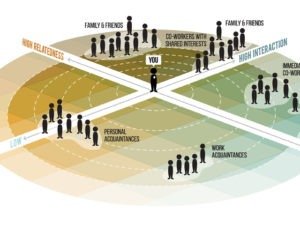For companies to truly understand the impact of employee engagement on performance, they must first go beyond the infrequent, top-down survey and focus on the individual experiences of workers and the forces that influence our daily work lives.
Although approaches to individual employee engagement differ among organizations, through our own independent research we’ve found five emotional constructs at the heart of each strategy: Trust, Altruism, Happiness, Belonging, and Achievement.
Trust
Trust is important. Trust is the confidence we place in others. Without trust, we wouldn’t experience love or friendship, not to mention have a functioning economy or government. For high-performing organizations, trust is the bedrock of their culture.
You can gauge the level of trust present in a given workplace through the way organizational transparency, dependability, and accountability manifest. When trust is high in an organization employees innovate more, work more productively, and exhibit lower levels of stress.
Conversely, when trust is low, or even absent in a workplace, negativity abounds. Distrust can have a negative impact on employee engagement. It gives way to a less productive workforce and lack of confidence in company leadership. Employees are forced to redirect their energy away from creative problem solving and innovative pursuits into defensive behaviors in response to the pervasive doubt and micromanaging in low trust organizations.
So where does trust come from? Put simply, commonality. As we discuss in our white paper How Relationships Shape Engagement and Culture, discovering, exploring, and experiencing this “relatedness” is at the foundation of all human relationships. In-person experiences and digital communication have become a fundamental part of how human beings express themselves and their interests, thereby making new and reinforcing existing connections. When employers make relationships the center of their employee engagement strategy, trust flows freely and strengthens the bonds of the work community.
Related: Why Relationships in the Workplace Matter More Than You Think
Altruism
One of the most powerful symptoms of trust is altruism. Although we tend to think of altruism in terms of philanthropy, in the workplace (as in our personal lives) it’s as simple as putting the needs of others ahead of yourself. At work, you’re most likely to see altruism when employees help colleagues with something outside their responsibilities or sacrifice resources that might benefit their project or department for the greater good of the organization.
Altruists are the backbone of a workplace’s support system. Even though they’re more likely to help colleagues outside their team or department with discretionary time and effort, they still see to their own duties with conviction. Workplace altruists tend to be more committed to their job, fulfilling the full responsibilities of their position, and are less likely to leave an organization.
However, perhaps the most significant benefit is altruism’s virtuous cycle. Altruists at work create more workplace altruists. Stanford psychologists found that our relationships with others, even brief ones, have a stronger influence over altruism than innate human behavior. While some people may naturally feel the desire to perform altruistic actions, they’re more likely to follow through on their intentions when they see others doing the same. In short, the stronger the relationships are in your workplace, the more employees will exhibit workplace altruism.
Happiness
Happiness isn’t a singular emotion and varies from person to person. Contemporary studies suggest happiness falls on a spectrum between two poles: hedonism and eudaimonism. Some people value fulfilling their potential over the pursuit of pleasure, and others the opposite. However, there is no mixture of these qualities that can universally apply to everyone.
Happiness is a chief influencing factor when it comes to the concerns of company leadership: employee retention, absenteeism, and productivity. Employee happiness contributes to the impact of employee engagement on performance. Happy employees are less likely to skip work, more resistant to turnover, and capable of producing more without sacrificing the quality of their work.
Addressing happiness at work can be difficult because it is easily influenced by subtle factors. However, happiness can be more broadly shaped by promoting human relationships in the workplace. Relatedness is a basic human need, viewed by some researchers as being the essential factor in producing happiness. Leaders who advocate for work relationships signal to their employees that they prioritize and value the well-being of their workforce.
Belonging
A universal feeling among all individuals, belonging is our need to feel connected to other people. Belonging is the first psychological need on Maslow’s Hierarchy of Needs, prioritized over our sense of achievement and self-actualization. If you’ve ever played Jenga, you know what happens if you pull out the bottom supporting brick. When belongingness is absent, our mental health suffers. Not only do people who feel like outsiders exhibit lower levels of happiness and adjustment, but they’re also more prone to mental and physical illness.
Human relationships are the key to our sense of belonging. Belongingness by definition can only develop through frequent, positive interactions between individuals who demonstrate respect and care for one another. It is impossible to feel belongingness without the presence and support of another person.
Conventional wisdom is supported by scientific fact when it comes to developing belongingness in the workplace. The sense of belonging produced by human relationships at work is not only beneficial to employees’ well-being but their overall attitude toward their work experience. Employees with best friends at work are all around high performers who are twice as likely to spend their career with the company.
Achievement
It’s human nature to strive for achievement and desire recognition for our accomplishments. The emotions we feel when we accomplish our goals, and when others recognize those accomplishments, are powerful. So powerful, in fact, that recognition has the strongest individual impact on employee job satisfaction out of both intrinsic and extrinsic motivators. Therefore, recognition has a significant impact on employee engagement.
Although we derive a degree of self-validation from our achievements, our accomplishments are imbued with a new sense meaning when others recognize us for them. Today that impact is now amplified through the proliferation of social communication tools, where likes and shares are exchanged as currency between friends. In the workplace, promoting recognition is synonymous with promoting relationships. When employees recognize each other, it strengthens the bond between them. These bonds have a significant impact on employee engagement.
As HR professionals tailor their engagement strategies to the experience of the individual worker, two things must be kept in mind. Human relationships have a profound, if not singular, effect on the emotions people experience at work and the impact of employee engagement on performance. Substantive solutions to engagement will address both of these areas in tandem.



 5 min
5 min




